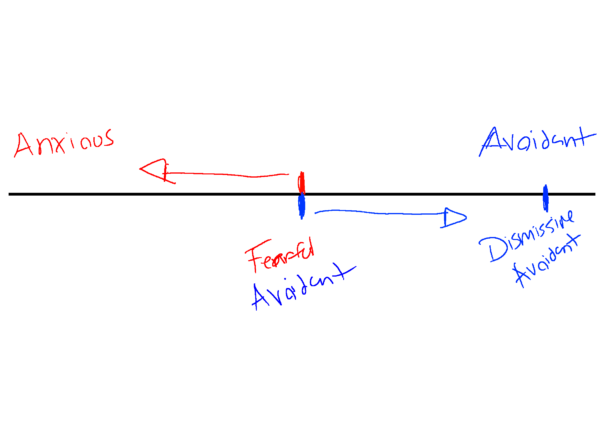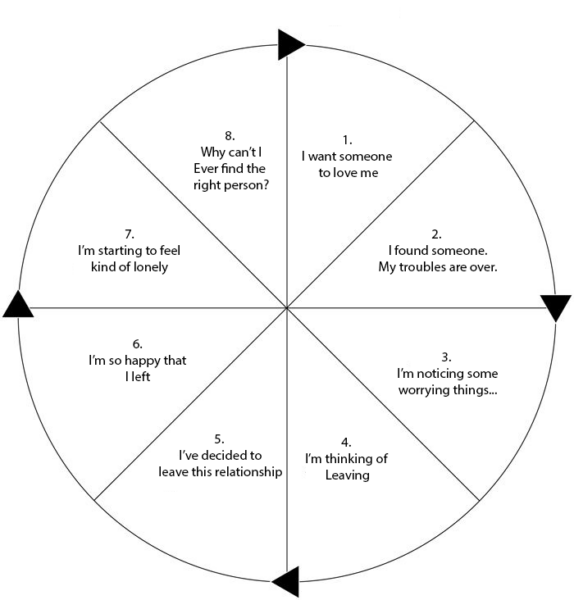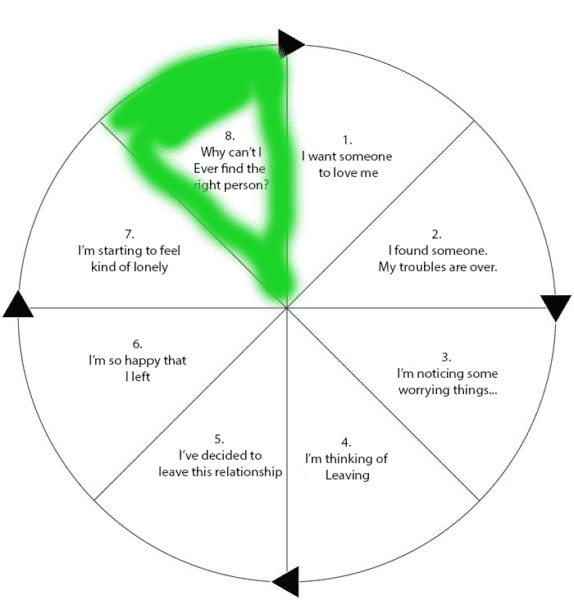Today we’re going to be answering the age old question of if avoidants feel guilt.
In short, yes, avoidants can feel guilt but it’s often warped and used in ways that are unhealthy.
More on that in a minute.
After spending the better part of a few hours researching this topic I’ve come to the conclusion that any discussion of guilt and avoidants turns into philosophical discussion on proper coping mechanisms.
I’d like to have an open discussion based on attachment style research around guilt which will require me to dive in to some potentially uncomfortable topics like,
- Defining Avoidant Behavior
- Their Inability To Properly Process Guilt
- An Avoidants Need To Thrive On Guilt
Let’s begin!

What Are Your Chances of Getting Your Ex Boyfriend Back?
Take the quizDefining Avoidant Behavior
What should be a seemingly simple practice of defining avoidant behavior is actually a lot more complicated than you can imagine due to the fact that there are really two types of avoidants.
- Dismissive avoidants
- Fearful avoidants
And one is definitely more prone to guilt than the other one on the outset of a breakup.
It’s best to view the two different type of attachment styles as being on a spectrum.
On one side of the spectrum you have incredibly anxious behaviors.
- Insecurity of being abandoned
- Needing constant re-assurance
- Trying to fix unfixable problems in the relationship
- Being jealous when a partner spends more time with someone else than them
On the other side of the spectrum you have incredibly avoidant behaviors.
- Constantly thinks their independence is being threatened by a partner
- Tends to be self reliant in life
- Downplays importance of relationships
- Doesn’t often talk about their feelings
- Doesn’t believe they need help in relationships
Now, the dismissive avoidant falls pretty much on the avoidant side of the spectrum meaning they are going to exhibit those extreme avoidant behaviors.
The fearful avoidant on the other hand is going to bounce like a ball between one spectrum to the next.
Which creates an interesting problem. Does one type of avoidant attachment style feel guilt more than the other one?
Well, here’s where I land on it.
I think both attachment styles feel guilt but the fearful avoidant is going to be a little more outward about it. Meanwhile the dismissive will internalize and almost use it to perpetuate their torment.
For our purposes I’d actually like to dive in a bit on how dismissives handle guilt.
An Avoidant Doesn’t Process Guilt Properly
Let’s take a look at our handy dandy avoidant relationship death wheel as it becomes relevant in this discussion.
What you see here is essentially the life cycle of a relationship for an avoidant. There are eight stages to it.
- They start out wanting someone to love them
- They find you and believe their troubles are over
- They notice some worrying things
- They begin to think about leaving
- They leave the relationship
- They are happy they left the relationship
- They begin to feel lonely
- They wonder why this is always happening to them
For our purposes we are really interested in this section of the wheel right here,

What Are Your Chances of Getting Your Ex Boyfriend Back?
Take the quizYou see, what a normal, secure individual would do during this stage would be to take stock of what went wrong in the relationship. Take ownership on what they can improve on and then improve it.
You are allowed to feel sorry for yourself.
You are allowed to feel victimized.
You are allowed to feel guilt for any misdeeds you committed throughout the relationship but where this gets really complicated is when you consider the fact that avoidants often make their lives more complicated by running from guilt.
According to Free To Attach,
Unable to healthily hold space for their own needs and effectively process guilt, with a new person they once again feel temporarily safe from being overwhelmed by someone else’s and so better able to enjoy connection
This is why I think we see so many avoidants going on the rebound. They believe that the best way to handle guilt is to distract themselves from it or in some cases not taking ownership for any mistakes they made.
Here’s where philosophically this discussion becomes fascinating.
Guilt in an odd way is about taking ownership. Show me someone who doesn’t feel guilty and I’ll show you a person that doesn’t think they’ve done anything wrong.
We feel guilty when we know we did something wrong.
And yet so often in our coaching practice we see clients exes refusing to take ownership for mistakes they made. It’s much easier to blame another person than take ownership.
And it appears that avoidant individuals are excellent at deflecting blame.
Why?
Probably because guilt hurts. Ownership hurts.
Remember avoidants, well, they avoid.
And yet this discussion becomes even more nuanced when you consider that in a weird way an avoidant needs to guilt.
An Avoidants Need To Thrive On Guilt
You know what sucks about getting old?
(Besides your body breaking down.)
It’s the fact that you are constantly out of the loop on the latest relationship terminology.
In my fathers day “dating” was called “going steady.”
Each generation has their own lingo for relationships.
So, I felt pretty shi*y when I found out that “pain shopping” was a thing. Just a few months ago was the first time I had ever come across the term.
See, I’m getting old.

What Are Your Chances of Getting Your Ex Boyfriend Back?
Take the quizPain Shopping: When you go to look for things to purposefully hurt over
The number one priority for an avoidant after a breakup is to do everything they can to keep that person at an arms length.
- They don’t want to process their emotions.
- They don’t want to reconcile.
- They don’t want to do anything that threatens this newfound independence.
Once again pulling from Free To Attach,
Avoidants’ in-built defensiveness and difficulty with the vulnerability of emotional openness also makes them less likely to apologise to people they hurt, in spite of the guilt they may feel.
And yet, in our research on avoidants and how they “miss you” we found something almost contradictory.
They want someone to love them but they don’t won’t let anyone close enough to do so.
In other words, in an avoidants mind the best relationship is a phantom one. A relationship that they can daydream about but not have the actual fear of commitment involved.
So, their modus operandi is to use guilt as a way of preventing them from getting a commitment.
Seems contradictory, right?
On the one hand I make the argument that avoidants want to avoid guilt but on the other hand they want to hold on to it.
I think as a whole they don’t want to feel the horrible feelings associated with it. However, they recognize guilt as a great way of preventing them from ever getting into a relationship with that person again so they hold on to it.
Almost like they are storing it for just the right moment.
They pain shop it essentially. It’s their currency. Their protection from losing their independence.
It’s the whole iceberg approach,
On the surface they appear normal but beneath, they hold on to that small thread of guilt knowing it might come in handy assuming you try to get back together with them.
This is why so many of our clients struggle with avoidants. Any fall back into old behavior triggers the trauma of the relationship for an avoidant and that guilt comes to the surface causing them to avoid.



Renae
February 28, 2025 at 11:28 pm
Agree with Ana’s comments. Please respond to Ana’s post.
Ana
October 7, 2024 at 6:21 pm
I am confused a bit. Why would guilt prevent them from reconnecting with an ex? Would it not push them to want to make things right? Doesn’t guilt make people want to right wrongs so they don’t feel it?
An avoidant feeling guilt and using it to prevent them from being with someone just isn’t clicking for me. If they feel guilty, why would that help them?
Simon
June 20, 2023 at 4:53 pm
Quite scary and real reading this
Quite fascinating too
My ex was a dismissive avoidant. First time for me. It’s meant to be the guy that is dismissive avoidant. For me it was my ex gf.